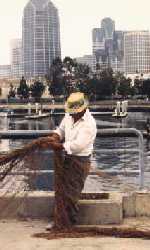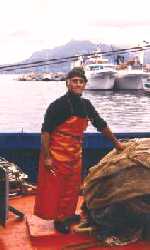 |
 |
| San Diego Harbor | Porticello Harbor |
The ritual of the Madonna del Lume is presented in this dissertation by means of the CD-ROM which is the core of this work. It follows the Gadamerian concept of ritual as a play. I represented the celebration of the Madonna del Lume in Porticello, a small fishing village in Palermo, Sicily and in San Diego, California in a play format. In the play, I point out the similarities and the differences between the celebrations in these two locales. In the San Diegan celebration, for example, the way that the icon is carried, the vocal style of the invocations, the communal organization of the ritual, the sense of leadership and solidarity among the fishermen, the respect for and authority of the older generations, and the division between men and women have been preserved. In the analysis of the ritual of the Madonna in Porticello I consider these same aspects as essential to the celebration and inextricably tied to a sea culture.
 |
 |
| San Diego Harbor | Porticello Harbor |
The element which bridges the two communities and the two celebrations is the sea. The sea is the source of the community's livelihood in Porticello. In San Diego this is symbolically true, since they refer to themselves as descendants of fishermen. Following Turner's analysis of symbols in ritual , I disclose the symbolic relationship between the Madonna del Lume and the sea. Ritual usually has a foundation myth. In the case of the Madonna del Lume, this myth recounts her divine origin from the sea. The festival of the Madonna del Lume, celebrated every year by the Sicilian community in Porticello as well as in San Diego, functions as a bridge between the old and the new country. It is a bridge between a community split over two parts of the world, and yet united by a shared belief system. The sea, which symbolizes the source of their traditional livelihood, links these two communities.
The sound of the invocations echoes during the days of the celebration in Porticello and in San Diego because it still fulfills a similar purpose -- to thank the divinity for the grace given. The invocation in Porticello leads us to the world of fishermen. The people in San Diego emigrated as fishermen and they brought with them their tradition and their faith. The ritual survived despite the social and economic changes, preserving a strong sense of belonging to a tradition linked to the sea. The sound is intrinsically tied to the world of the fishermen. During the fishing activities, they sing the invocations, re-enacting the ritual with the same form and social structure as is practiced in the church.